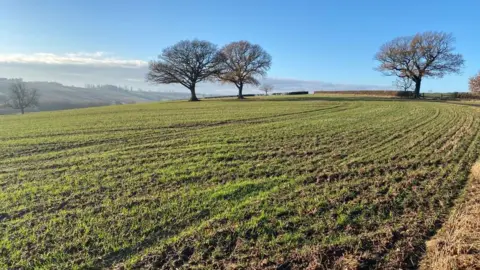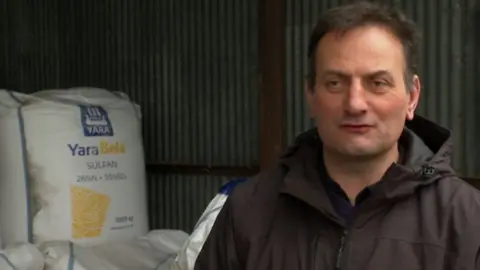Food price hike warning as fertiliser costs triple
 BBC
BBCFarmers are warning food prices could rise further after seeing the cost of artificial fertiliser more than triple.
Nitrogen fertiliser - used to grow crops such as wheat, vegetables and pulses - has risen from £300 per tonne to £1,000.
It means shoppers could see a spike in the cost of household items like cereal, animal feed, oil and beer.
The warning, from food producers, comes on top of the highest rise in food prices in a decade.
Andrew Williamson, based outside Bridgnorth in Shropshire, grows about 900 acres (364 hectares) of arable crops, such as winter wheat, rapeseed, barley and oats.
In June 2021 he purchased a haul of fertiliser for £300 per tonne in order to harvest crops in November. The cost has now risen by more than 200%.

He fears he will now be left with drastically scaled down yields after having to reduce the amount of fertiliser he uses.
"The issue we have now is, the cost of fertiliser has increased and will have an impact on our business decisions", he told the BBC.
Mr Williamson added: "I don't want to be alarmist about food security and food prices, but off the back of what we've seen in Ukraine and energy security, we also need to start thinking about food security."
Rising wholesale gas prices - exacerbated by the war in Ukraine and disruption of energy exports from Russia - have increased the production costs of fertilisers for farmers.
Natural gas is a key component in the production of artificial fertilisers.

Synthetic vs natural fertilisers
- Fertilisers are materials that can be added to soil or plants to provide nutrients and promote growth
- Natural fertilisers are organic products that have been extracted from living things, such as animal manure
- Synthetic fertilisers made up of chemicals and are usually manufactured from petrol or natural gas


Follow BBC West Midlands on Facebook, Twitter and Instagram. Send your story ideas to: [email protected]
